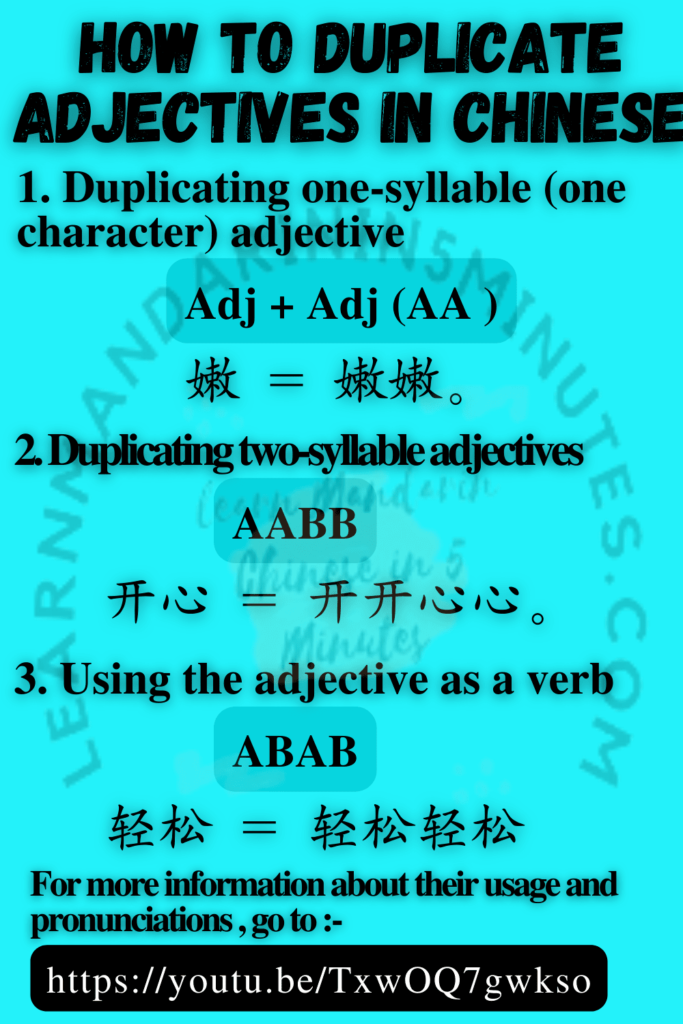Today, we are going to learn how to duplicate adjectives in Chinese. Duplication of words or adjectives is one of the unique features of learning the Chinese language.

How to duplicate adjectives in Chinese?
Duplicating adjectives in Chinese can be done in the following ways:-
1. Duplicating one-syllable (one character) adjective
Adj + Adj + 的 ( AA +的)
婴儿的皮肤嫩嫩的。
Yīng’ér de pífū nèn nèn de.
The baby’s skin is soft and tender.
泉水凉凉的。
quánshuǐ liáng liáng de.
The spring water is cooling.
2. Duplicating two-syllable adjectives
When duplicating two-syllable adjectives, you should repeat each character individually rather than the whole word. The sentence structure is,
AABB +的
For example, let us see how to duplicate the Chinese word for happy – 开心 kāi xīn
According to the sentence structure AABB, 开 represent A and 心 is B. Duplication for this is 开开心心 kāi kāi xīn xīn.
Another commonly used two-syllable adjective would be 干净 gān jìng, which means clean. When duplicating this adjective, it is 干干净净 gān gān jìng jìng.
Do take note that not all one-syllable or two-syllable adjectives can be duplicated. For example, 美丽 měi lì, which means pretty, cannot be duplicated as 美美丽丽 měi měi lì lì.
The above two duplication structures are known as complete duplication (完全重叠式 Wánquán chóngdié shì )
3. Incomplete duplication
The third type of duplication is not very common. The sentence structure is,
A + 里 + AB
For example, the Chinese word 啰嗦luō suo, which is the English equivalent for long-winded, can be duplicated to become 啰里啰嗦 luō lǐ luō suo. Other examples are,
傻里傻气 shǎ lǐ shǎ qì fool
土里土气 tǔ lǐ tǔ qì rustic
慌里慌张 huāng lǐ huāng zhāng in a hurried and confused manner
古里古怪 gǔ lǐ gǔ guài weird
4. Using the adjective as a verb
The sentence structure is,
ABAB
For example, the Chinese word 冷静 lěng jìng, which means to be calm can be duplicated to become 冷静冷静 lěng jìng lěng jìng.
不要激动,冷静冷静。
bù yào jīdòng, lěng jìng lěng jìng.
Don’t be worked up, calm down.
下班了,我们高兴高兴去。(高兴 can also duplicated as 高高兴兴 – adjective )
Xià bān le, wǒ men gāo xìng gāo xìng qù.
Work is done, let us go enjoy ourselves.
Other Chinese words that can be duplicated and used as a verb are:
热闹 = 热闹热闹 (热热闹闹)rè nào = rè nào rè nào (rè rè nào nào) lively
轻松 = 轻松轻松 (轻轻松松)qīng sōng qīng sōng (qīng qīng sōng sōng) easy
凉快 = 凉快凉快liáng kuai = liáng kuai liáng kuai cool off
清净 = 清净清净qīng jìng = qīng jìng qīng jìng peace and quiet
How to use duplication
You may probably ask what the purpose of reduplication is. Well, the grammatical meaning of a sentence is different depending on where the duplication is placed. For example,
1. Use as a predicate 谓语
If the adjective is used as a predicate, it is describing a feeling rather than just an objective description.
豆腐嫩嫩的。 Dòu fu nèn nèn de. Tofu is soft.嫩嫩的 is describing a feeling.
这柠檬怎么甜甜的?
zhè níng méng zěn me tián tián de?
Why this lemon tasted sweet?
2. Used as an adverb 状语 or a complement 补语
When using adjective as an adverb, the sentence structure is
AABB + 地 + verb
The duplicated adjective describes a degree. For example,
她清清楚楚地看到车祸的经过。
tā qīng qīng chǔ chǔ de kàn dào chē huò de jīng guò.
She saw the accident very clearly.
他把书包轻轻地放下。
tā bǎ shū bāo qīng qīng de fang xià.
He gently put down the schoolbag.
When using adjective as a complement, the sentence structure is,
得 + AABB / AA + 的
她把房间整理得干干净净的。
tā bǎ fáng jiān zhěng lǐ de gàn gān jìng jìng de.
She tidied the room till it’s very clean.
小明把脸晒得黑黑的。
Xiǎomíng bǎ liǎn shài de hēi hēi de.Xiao Ming tanned his face till dark.
3. Cannot use degree word such as 很/极了/有点儿/得很 or negation word such as 不
她轻轻松松地做完所有的功课。
tā qīng qīng sōng sōng de zuò wán suǒ yǒu de gōng kè.
She finished all her homework with ease.
*you cannot say她很轻轻松松地做完所有的功课。(wrong)You should say她很轻松地做完所有的功课。
他有一个干干净净的家。
tā yǒu yī gè gān gān jìng jìng de jiā.
He has a clean home.
*you cannot say他有一个不干干净净的家。(wrong)You should say他有一个不干净的家。
4. Use as a modifier for quantifier phrase or noun with quantifier phrase
他整整一天没有吃饭。
tā zhěng zhěng yī tiān méi yǒu chī fàn.
He has not eaten all day.
他用整整一天功夫把车子修好。
tā yòng zhěngzhěng yītiān gōng fū bǎ chē zǐ xiū hǎo.
He took a whole day to fix the car.
5. Use in front of verbs like 觉得/喜欢/ 是 /感觉
她的哥哥是高高,瘦瘦的。
tā de gē ge shì gāo gāo, shòu shòu de.
Her brother is tall and thin.
我的舌头感觉苦苦的。
wǒ de shé tou gǎn jué kǔ kǔ de.
My tongue has a bitter taste.
她喜欢高高,帅帅的男生。
tā xǐ huān gāo gāo, shuài shuài de nán shēng.
She likes tall and handsome men.
我觉得平平淡淡的生活比较适合我。
wǒ jué dé ping píng dàn dàn de shēng huó bǐ jiào shì hé wǒ.I think a quiet and simple life is more suitable for me.
What adjectives cannot be duplicated?
1. Adjectives in written forms are normally not able to be duplicated.
Adjectives that express the characteristic and attributes of things and colloquial adjectives can be duplicated.
高高 gāo gāo – tall
大大 dà dà – big
帅帅 shuài shuài – handsome
2. Non-predicate adjectives cannot be duplicated
- 男 nán man
- 女 nǚ woman
- 雌 cí female
- 雄 xióng male
- 单 dān single
- 大型 dàxíng large
- 初级 chū jí elementary
Please check out our youtube channel for this lesson here!
